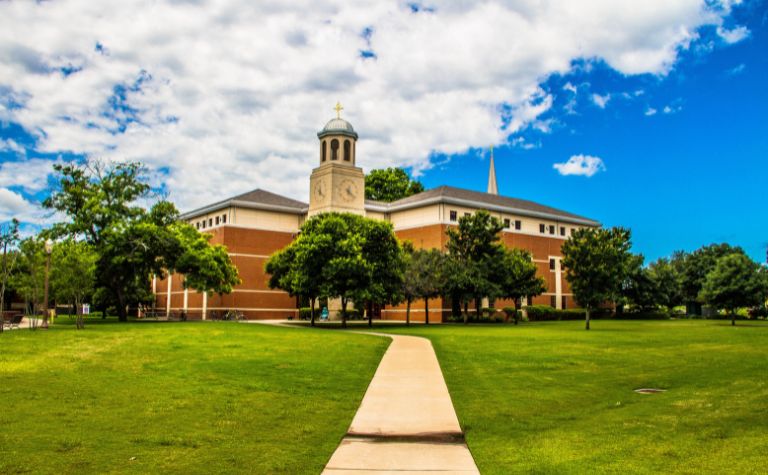The Master’s Seminary, located in Sun Valley, California, has established itself as a leading institution for theological education.
Founded under the leadership of Pastor John MacArthur and closely associated with Grace Community Church, the seminary has been unwavering in its commitment to the authority of Scripture and its application in all areas of Christian life and ministry.
This article aims to provide a clear overview of the core beliefs and theological positions held by The Master’s Seminary, shedding light on its doctrinal foundations and their impact on the seminary’s educational approach and broader influence.

Doctrinal Stance and Core Beliefs
At the heart of The Master’s Seminary’s teachings is an unwavering commitment to the authority and inerrancy of Scripture.
The seminary upholds the Bible as God’s final and complete revelation to humanity, free from error in its original manuscripts and wholly trustworthy in its teachings and commands.
Central to the seminary’s doctrinal position is an affirmation of the doctrines of grace.
These doctrines emphasize the sovereign work of God in the salvation of sinners, underscoring concepts such as total depravity, unconditional election, and the perseverance of the saints.
The Master’s Seminary holds a Reformed perspective on soteriology, focusing on God’s role in initiating and completing the salvation process.
Additionally, the seminary’s teachings are rooted in a dispensational understanding of Scripture.
This viewpoint recognizes distinctions in God’s dealings with humanity across different epochs of redemptive history, particularly regarding covenants and prophecies.
The doctrine of the Trinity, the deity of Christ, His virgin birth, sinless life, substitutionary atonement, bodily resurrection, and imminent return are also foundational beliefs at The Master’s Seminary.
Furthermore, the seminary maintains a complementarian view of gender roles within the church and the home, emphasizing distinct roles for men and women while upholding their equal value and worth in God’s eyes.

The Emphasis on Expository Preaching
Expository preaching, a method of faithfully explaining and applying the text of the Bible, is a cornerstone of the educational and ministerial approach at The Master’s Seminary.
Recognizing the power and authority of Scripture, the seminary champions this style of preaching as the most effective way to convey God’s Word to a congregation.
At The Master’s Seminary, students are trained to approach the Bible with a keen focus on understanding its original context.
This involves a thorough study of the historical, cultural, and linguistic backgrounds of a text.
The aim is to grasp the author’s intended meaning and then communicate that meaning clearly and applicably to a contemporary audience.
This emphasis on expository preaching ensures that God’s Word remains central in the proclamation, rather than personal opinions or popular topics.
It’s about letting the Bible speak for itself, allowing its truths to shape the sermon’s structure and content.
Furthermore, The Master’s Seminary believes that congregations are equipped with a comprehensive understanding of Scripture through expository preaching.
As pastors systematically teach through books of the Bible, believers gain a holistic view of its teachings, themes, and doctrines.
In essence, The Master’s Seminary sees expository preaching not merely as a preaching style, but as a commitment to uphold the sufficiency and authority of Scripture, ensuring that God’s Word is clearly communicated and applied to the lives of believers.

Views on Church Leadership and Ministry
The Master’s Seminary holds clear and distinct views on church leadership and ministry, rooted in its interpretation of New Testament teachings.
Leadership within the local church is seen as a significant responsibility entrusted to qualified men who meet the biblical criteria outlined in passages like 1 Timothy 3 and Titus 1.
The role of an elder, often synonymous with pastor or overseer, is highly regarded within the seminary’s framework.
Elders are tasked with shepherding the flock, teaching sound doctrine, and guarding the church from false teachings.
The Master’s Seminary emphasizes the plurality of elders in church leadership, promoting shared responsibility and mutual accountability among the elders.
Moreover, the seminary adheres to a complementarian view of roles within the church.
This perspective maintains that while men and women are equal in essence and value, they have been assigned different functions within the church and the home.
As such, the office of elder or pastor is reserved for men, while women play vital roles in other capacities, contributing significantly to the life and health of the church.
Deacons, another office mentioned in the New Testament, are also recognized by The Master’s Seminary.
They serve the church by attending to various practical needs assisting the elders in ensuring the smooth functioning of the congregation.
On ministry, The Master’s Seminary believes that every believer is equipped and called to serve in some capacity.
Spiritual gifts, bestowed by the Holy Spirit, are to be used for the edification of the church and the spread of the gospel.
Therefore, training and equipping all members for ministry is seen as a core function of church leadership.
Contemporary Issues and Positions
In today’s rapidly changing world, a range of contemporary issues challenge churches and theological institutions.
The Master’s Seminary, being grounded in its commitment to the authority of Scripture, has taken clear positions on several of these matters, seeking to provide guidance to its students and the broader Christian community.
On the matter of the inerrancy of Scripture, The Master’s Seminary holds an unwavering stance.
They believe that the Bible, in its original manuscripts, is without error and is wholly trustworthy in all its claims and teachings.
This perspective shapes the seminary’s approach to all other issues, as the Bible is considered the final authority.
Regarding human sexuality and marriage, the seminary upholds a traditional biblical view.
Marriage is defined as a covenantal relationship between one man and one woman, and sexual relationships are to be reserved for this union.
The seminary also acknowledges and teaches about every individual’s inherent value and worth, regardless of their sexual orientation.
On the topic of creation, The Master’s Seminary maintains that God directly and purposefully created the universe and all life within it.
While there are varied opinions on the specifics of the creation account, the seminary’s focus remains on the Creator’s sovereign work and design.
The Master’s Seminary also addresses social justice and cultural engagement matters.
While advocating for justice and righteousness in all areas of society, the seminary emphasizes the primacy of the gospel message and the transformative power of personal salvation through Christ.
In addressing these and other contemporary issues, The Master’s Seminary seeks to bring the wisdom and clarity of Scripture to bear, guiding believers to navigate the challenges of the modern world with conviction and grace.
Recent Posts
David Jeremiah, a renowned pastor, author, and speaker, has captivated the hearts of many with his compelling sermons. His messages resonate deeply with diverse audiences, leaving an enduring...
Tim Keller, a distinguished pastor, theologian, and author, has garnered a devoted following through the profound impact of his sermons. In this article, we will explore seven compelling reasons...
